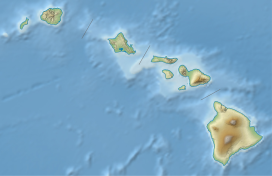Koko Crater
| Koko Crater | |
|---|---|
 Koko Crater with the Koʻolau Range in the background | |
| Highest point | |
| Elevation | 1,208 ft (368 m) |
| Coordinates | 21°17′10″N 157°40′53″W / 21.28611°N 157.68139°W |
| Geography | |
| Location | Honolulu County, Hawaii, United States |
| Geology | |
| Mountain type | Tuff cone |
| Volcanic arc | Hawaiian–Emperor seamount chain |
Koko Crater (Hawaiian: Kohelepelepe or Puʻu Mai) is an extinct tuff cone located on the Hawaiian island of Oʻahu near Hawaiʻi Kai. It is northeast of Hanauma Bay and south of the Koʻolau Range.
Geology[edit]
Koko Crater is a part of the Honolulu Volcanics, which were craters that formed as vents of the Koʻolau Volcano during its rejuvenation stage.[1] Other notable landmarks within the Honolulu Volcanics include nearby Hanauma Bay and the well-known Diamond Head crater.[1]
Koko Crater, Hanauma Bay and other nearby tuff cones form the Koko Rift Zone, which marks the latest episode of volcanic activity on the island of Oahu.[1] Radiocarbon dating suggests that the latest eruption within the Koko Rift Zone occurred 7,000 years ago,[1] although the validity of these results are disputed.[2] Its elevation is 1,208 ft (368 m), making it the tallest and most preserved tuff cone in the area.[1]
Trail[edit]
During World War II, the US military built bunkers on top of Koko Crater with a railroad leading to its summit.[3] In 1966, the air force ceded administration of Koko Crater over to the City of Honolulu. It was then renamed to the Koko Head Regional Park.[3] Within this park is the Koko Crater Trail, which is a .42-mile-long trail that uses the now-abandoned railroad as its pathway.[4][5]
Mythology[edit]
Its original Hawaiian name was Kohelepelepe – Hawaiian for vagina labia minor.[6]
The legend tells a story where Pele, goddess of vulcanoes and fire, was attacked on Hawaii by Kamapuaʻa, a shapeshifing man with a pig head. Her sister Kapo came to her aid, luring the attacker away by throwing her vagina to Oʻahu. Kamapua'a followed it to the location of Koko head, where it left a deep imprint, believed to be Koko crater.[7][8][9]
See also[edit]
References[edit]
- ^ a b c d e "Hanauma Bay Geology". www.honolulu.gov. Retrieved 2020-08-10.
- ^ Rubin, Ken. "Volcanic Eruptions on Oahu". www.soest.hawaii.edu. Retrieved 2020-08-10.
- ^ a b "KOKO HEAD HIKE: 1,048 RAILWAY STAIRS TO THE CRATER". Journey Era. 2019-02-05. Retrieved 2020-08-10.
- ^ "Koko Crater Trail". AllTrails.com. Retrieved 2020-08-10.
- ^ "Koko Head Crater Trail Hiking Trail, Waimānalo Beach, Hawaii". Hiking Project. Retrieved 2020-08-10.
- ^ Kohelepelepe hilo.hawaii.edu
- ^ Puaʻakanu hilo.hawaii.edu Retrieved 2023-05-31
- ^ Koko crater to-hawaii.com Retrieved 2023-05-31
- ^ Kama-pua‘a sacred-texts.com, pg. 212 Retrieved 2023-05-31

